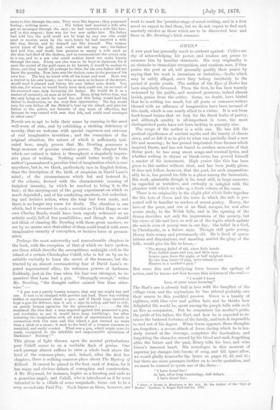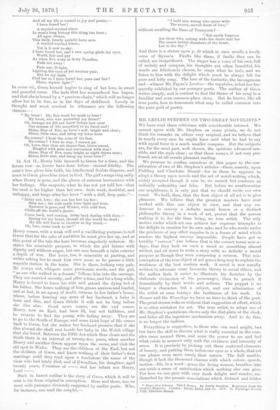GWEN.*
A NEW poet has generally much to contend against. Critics are shy of acknowledging his power, and readers are prone to measure him by familiar standards. His very originality is an obstacle to immediate recognition, and cautious men, if they
praise the poet at all, will generally qualify their praise by saying that his work is immature or imitative,—faults which may be safely alleged, since they belong inevitably to the period of poetic youth. The author of the Epic, of Hades has been singularly favoured. From the first, he has been warmly welcomed by the public, and received generous, indeed almost lavish, praise from the critics. Seine, no doubt, have hinted that he is writing too much, but all poets or romance-writers blessed with an affluence of imagination have been accused of this fault, which is one nearly allied to a virtue. It is not from hard-bound brains that we look for the finest fruits of poetry, and although quality is all-important in verse, the most distinguished poets have not been lacking in quantity also.
The range of the author is a wide one. He has felt the poetical significance of ancient myths and the beauty of classic story, and. so felt it as to give to what was partially dead a new life and meaning ; he has gained inspiration from themes which
inspired. Dante, and has not feared to awaken memories of that divine poet ; he has sung sweet songs and musical lyrics, and whether writing in rhyme or blank-verse, has proved himself
a master of his instrument. High praise like this has been given to this author without stint, and has been justly given.
It does not follow, however, that the poet, for such unquestion- ably he is, has proved his title to apiece among the Immortals.
His work, admirable though it be, must still, iu large measure, be regarded as tentative, and curiosity is mingled with the pleasure with which we take up a fresh volume of his verse.
There is no originality in the slight plot which links together the Six Acts of Gwen and. the form in which the tale is pre- seated will be familiar to readers of recent poetry. Henry, the hero of the poem, and son of au Earl, escapes, for rest after severe study, to the Welsh hills, and in the opening of the drama describes not only his impressions of the scenery, but his views of life and love, as well as of the topios which agitate the minds even of young men in our day,—the belief in a God, in Christianity, in a future state, Though still quite young, Henry feels weary and prematurely old. He is tired of specu- lations arid disputatious, and standing amidst the glory of the hills, would give his life to know,—
" The strong Belief of old, when little bands Were folded morn and eve, and little eyes Scarce open from the night, or half weighed down By the long hours of play, were raised to see Heaven in a mother's gaze."
But some dim and paralysing force freezes the springs of action, and he knows not how ta cure this sickness of the soul :—
" I would I knew
Less, or grew wiser knowing."
The Earl's son is already half in love with the daughter of the village vicar, and the aspirations he has uttered probably owe their source to this youthful passion. Gwen is a beauty of eighteen, with blue eyes and golden hair, and he thinks how delightful life would. be, spent among the purple hills with such an Eve as companion. But be remembers his mother's pride, the pride of his father, the Earl, and how he is expected to re- trieve the battered fortunes of the family, and feels it impossible to wed out of his degree. When Gwen appears, these thoughts are forgotten ; a severe attack of fever, during which he is ten- derly nursed at the vicarage, completes the fascination, and forgetting the obstacles caused by his blood and rank, forgetting alike the future and the past, Henry tells his love, and wins Gwen's innocent heart. His monologue in this moment of supreme joy changes into bursts of song, and did space allow, we would gladly transcribe the lyrics on pages 41, 43, and 45; but there are more passages further on to invite quotation, and we must be content to quote one of the three :—
"I have found her !
At last, after long wanderings, dull delays, I have found her;
* Gwen a Drama in Monologue, in Six Acts. By the Author of the Epic of Hades." London; C. Kogan Paul and Co. MO.
And all my life is turned to joy and praise,— I have found her!
A myriad-myriad times In man's long history this thing has been; All ages, climes, This daily, hourly miracle have seen A myriad-myriad times; Yet is it new to-day.
I have found her, and a new spring glade my eyes.
World, fair and gay As when Eve woke in dewy Paradise,
Fade not away I
Fade not, 0 light, Lighting the eyes of yet another pair, But let my sight
Find her as I have found her, pure and fair !
Shine, mystic light !"
In scene vii., Gwen herself begins to sing of her love, in sweet
and graceful verse. She feels that her womanhood has begun, and that she is bound by a "precious chain," which will no longer allow her to be free, as in the days of childhood. Lovely in thought and most musical in utterance are the following stanzas :— •
" My lover ! Oh, fair word for maid to hear ! My lover, who was yesterday my friend Oh, strange we did not know before how near Our stream of life smoothed to its fated and!
Shine, Star of Eve, as Love's self, bright and clear ; Shine, little star, and bring my lover here.
Ile comes! I boar the echo of his feet.
He-comes ! I fear to stay, I cannot go. Oh, Love, that thou art shame-fast, bitter-sweet, Mingled with pain and conversant with woe! Shine, Star of Eve, more bright as night draws near; Shine, little star, and bring my lover hero 1"
In Act IL, Henry bids farewell to Gwen for a time, and the lovers vow—as lovers have done before—eternal fidelity. The man's love gives him faith, his intellectual doubts disperse, and trust in Gwen gives him trust in God. The girl's songs ring sadly when Henry is gone, and the gloom of autumn harmonises with her feelings. She suspects, what he has not yet told her—that his rank is far higher than her own—feels weak, doubtful, and unhappy, and longs after her lover "with a dull, deep pain :"— " Delay not, love ; the sun has lost his fire:
Stay not ; the cold earth loses light and beat. Bummer is gone, and Winter, with cold feet,
Chills all the world's esire.
Come back, and coming, bring back Spring with thee,—
Spring for my heart, though all the world lie dead;
My life will burst in blossom at thy tread,— Oh, love, come back to me
Henry comes, with a weak will and a vacillating 'purpose; to tell Gwen that for the sake of ambition. he "mist give her up, and at this point of the tale the hero becomes singularly unheroic. He states his miserable purpose, to which the girl listens 'with dignity and without anger, but one sees beneath a calm exterior a depth of woe. Her lover, too, is miserable at parting, and writes asking her to meet him once more as he passes a little wayside station in the train. She is there, looking very pale. He jumps out, whispers some passionate words, and the girl, "as one who walked in a dream," follows him into the carriage. They are married secretly, and after a time, and for a long while, Henry is forced to leave his wife and attend the dying bed of his father. She hears nothing of him, grows anxious and fearful, and at last, in an agony of doubt, returns to her father's house, where, before hearing any news of her husband, a baby is born and dies, and Gwen thinks it will not be long before she dies also. Good news comes, ere the end comes. Henry, now an Earl, had been ill, but not faithless, and he returns to find his young wife fading away. They are to go to the South of Europe, and some faint hope of life comes back to Gwen, but she makes her husband promise that if she dies abroad she shall rest beside her baby in the Welsh village that she loved. Between the Fifth Act which thus closes and the Sixth there is an interval of twenty-five years, when another Henry and another Gwen appear upon the scene, and visit the
old spot in Wales. They are the children of the Earl, but not the children of Gwen, and know nothing of their father's first marriage until they read upon a tombstone the name of the
vicar who had lately died, and of gweullian, his daughter, aged twenty years, Countess of —, and her infant son Henry, Lord
Such in barest outline is the story of Gwen, which it will be seen is far from original in conception. Here and there, too, we meet with passages obviously suggested by earlier poets. Who, for instance, can read the couplet,—
"I hold him wrong who opona wide The secret, sacred doors of love,"
without recalling the lines .of Tennyson P-
" Not easily forgiven Are those who, setting wide the doors that bar The secret bridal-chambers of the heart, Let in the day."
And there is a stanza upon p. 47 which at once recalls a lovely verse of Byron's. Faults like these, if faults they can be called, are insignificant. The singer has a voice of his own, full of melody and compass, his thoughts are often beautiful, his words are felicitously chosen, he sings what he feels, and we listen to him with the delight which must be always felt for pure and lofty song. The love of the fantastic, the incongruous and —witness Mr. Payne's Lautree—the repulsive, is but too. fro- quently exhibited by our younger poets. The author of Gwen, writes simply, and is content to find the theme of his song in a familiar and even common-place story. But he knows, like all true poets, how to transmute what may be called common into the pure gold of poetry.



































 Previous page
Previous page